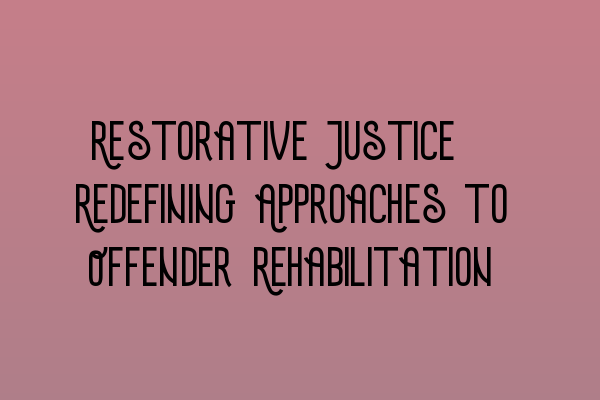Restorative Justice: Redefining Approaches to Offender Rehabilitation
In recent years, the criminal justice system has undergone significant changes in its approach to offender rehabilitation. Traditional punitive measures have increasingly taken a backseat to a more compassionate and holistic approach known as restorative justice. This paradigm shift seeks to address the root causes of criminal behavior and repair the harm caused to victims and communities.
Restorative justice focuses on the principles of accountability, empathy, and reconciliation. It recognizes that crime is not merely a violation of the law, but also a harm done to individuals and communities. By bringing together the offender, the victim, and relevant stakeholders, restorative justice aims to provide a safe and structured space for dialogue, understanding, and ultimately, healing.
The Benefits of Restorative Justice
Restorative justice offers several benefits over traditional punitive approaches. Firstly, it allows victims to have a voice and actively participate in the resolution process. Rather than feeling alienated and marginalized, victims are empowered to express their feelings, ask questions, and seek answers. This can be incredibly cathartic and promote a sense of closure for those who have suffered trauma.
Secondly, restorative justice promotes offender accountability and personal growth. By facing the consequences of their actions and hearing directly from those affected, offenders are forced to confront the harm they have caused. This facilitates introspection and can inspire genuine remorse and a desire to change. Through rehabilitation programs and support systems, offenders can develop the necessary skills and mindset to reintegrate into society as law-abiding citizens.
Thirdly, restorative justice contributes to community healing. By involving the community in the resolution process, it creates opportunities for collective learning and understanding. Communities can gain a deeper appreciation for the factors that contribute to crime and work together to address systemic issues. This collaborative effort strengthens social bonds and fosters a sense of unity and trust.
Implementing Restorative Justice
While restorative justice is gaining recognition and support, its implementation is not without challenges. Adequate training and resources are necessary to ensure the process is carried out effectively and safely. Additionally, it requires a shift in mindset from punishment-oriented to rehabilitation-focused. This cultural change must be embraced by all stakeholders, including law enforcement agencies, legal professionals, and policymakers.
To support the successful implementation of restorative justice, SQE Criminal Law & Practice Law UK offers comprehensive training programs that equip aspiring legal professionals with the knowledge and skills to navigate this evolving landscape. Our focus areas in SQE1 and SQE2: Mastering Key Concepts provide in-depth coverage of restorative justice principles and processes, preparing candidates for real-world scenarios they may encounter in their legal careers.
Adjusting your SQE strategy based on mock performance is an essential part of exam preparation. Mock exams provide valuable insights into your strengths and weaknesses, allowing you to tailor your study plan accordingly. To learn how to utilize SQE mock debrief sessions effectively, read our article on SQE Mock Debrief Sessions: Critical Steps for Improvement.
Post-mock feedback sessions are another crucial component in improving your performance. Our article on Post-Mock Feedback Sessions: Improving Your Performance explores how to analyze feedback, identify areas for improvement, and develop targeted study plans to enhance your overall exam readiness.
Conclusion
Restorative justice is a transformative approach that prioritizes healing, understanding, and rehabilitation. By providing a space for victims, offenders, and the community to engage in dialogue and repair the harm caused by crime, it offers a more humane and effective alternative to punitive measures. As legal professionals, it is essential to stay informed about these evolving approaches to offender rehabilitation. Discover how SQE Criminal Law & Practice Law UK can support your journey in mastering restorative justice principles and practices.
